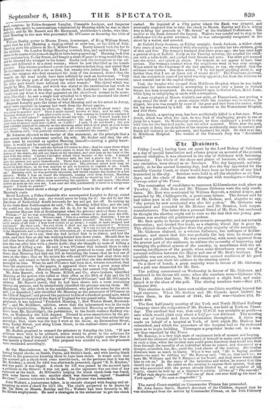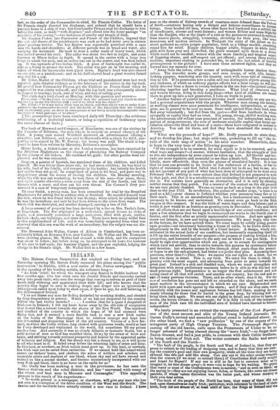Irbe Vrobintes.
Friday [week] having been set apart by the Lord Bishop of Salisbury as a day of special humiliation and solemn prayer on account of the present national visitation, it was observed in the city of Salisbury with becoming solemnity. The whole of the shops and places of business, with scarcely any exception, were closed as on Sundays. The day happened, unfortu- nately, to be the annual licensing-day, and also the day appointed for the monthly County Court, or there would have been no business of any kind transacted in the city. Services were held in all the churches as on Sun days, and the whole of them were thronged with worshipers.—Saliabury Correspmdent of the Times.
The nomination of candidates to represent Kidderminster took place on Tuesday; Mr. John Best and Mr. Thomas Gisborne were the only candi- dates. Mr. Best was nominated by William Boycott, a retired draper, and seconded by Mr. Chillingworth, a gentleman farmer. The former said he had taken part in all the elections of Mr. Godson, and, singular to say, "the person he now nominated was also his godson." Mr. Gisborne was nominated and seconded by Mr. Holmes and Mr. Brenton, both carpet- manufacturers. The latter was a personal friend of Mr. Best, but confessed he thought the election ought not to turn on the fact that one young gen- tleman was another old gentleman's godson. Mr. Best spoke in favour of progress towards prosperity, and not towards destruction; and decried free trade, as a claptrap whose day is gone by. This elicited shouts of laughter from the great majority of the assembly.
Mr. Gisborne claimed, as a veteran Reformer, the suffrages of Kidder- minster; and stated that this was probably the last time he should ever stand on a public hustings. He was proceeding, with much approval from the greater part of the audience, to enforce the necessity of improving and enlarging the political system of the country, in accordance with the ad- vancing intelligence of the people, when some disturbance arose out of a personal collision between the Mayor and one of Mr. Best's brothers. The squabble was not serious, but Mr. Gisborne seemed confident of his good standing, and cut short Ids address to the electing crowd.
On a show of hands, a great majority were in favour of Mr. Gisborne; and a poll was demanded for Mr. Best.
The polling commenced on Wednesday in favour of Mr. Gisborne, and continued in his favour till noon ; when the numbers were—Gisborne 176, Best 148. After that hour, Mr. Best obtained a slight lead, and main- tained it to the close of the poll. The closing numbers were—Best 217, Gisborne 200.
This election is said to have cost neither candidate anything beyond fair legal expenses. When Mr. Godson mid Mr. Ricardo spent 10,000/. be-. tween them, in the contest of 1841, the poll was—Godson 212, Ri- cardo 200.
The first half-yearly meeting of the York and North Midland Railway Company since the resignation of Mr. Hudson, was held at York on Thurs- day. The cardinal fact was, that only 17,8751. was available as profit—a sum which would yield only about a half per cent dividend. The meeting was one of turmoil and fierce exclamation throughout. A claim was made on behalf of a hospital at York, of 500/. which Mr. Hudson had subscribed, and which the promoters of the hospital had so far reckoned upon as to begin building. Thereupon a proprietor broke out, in a mass nor thus reported by the Times.
Mr. Ramsay, in a very high state of excitement both of manner and hinge* declared the claimant ought to be ashamed of himself to make such a proposition at such a time, when the medical men could prove hundreds that would lose their lives through the rascality of an individual whom he named, and denounced as a sharper, scoundrel, bar, &c., amid the loud cheers of the meeting. His brother directors were as much to blame. When it was said, "He is buying another estate—he must be robbing us," Mr. Ramsay said, "Oh no, that can't be; we have Mr. Williams and Sir J. Simpson at the board, and they never would allow him to rob us." In the name of the fatherless and widow, he moved that this should not be paid. He called on the meeting to express their opinion, that anx one who associated with the person already alluded to, or any member of lass family, should be held up as a disgrace to society. (Cries of "The rascals!" "What ruin they've caused!" "Not one of them can ever hold up his head in York again. "No men so despicable! ") The naval Court-martial on Commander Pitman has proceeded.
Mr. John James Smith, Master's Assistant of the Childers, deposed that be was discharged from the service by Commander Pitman, on the 10th February
last, on the order of the Commander-in-chief, Sir Francis Collier. The letter of Sir Francis simply directed his discharge, and ordered that be should have a passage home in a ship of war; but Commander Pitman read his discharge to him before the crew, as made "with disgrace," and offered him his home passage "on condition of his serving,"—two instances of cruelty and breach of duty.
Mr. Stephen Fisher, late Paymaster and Parser of the Childers, deposed that the sort and degree of the punishments was such as he had never seen in sixteen years' previous service. The by Hayter was repeatedly punished with a cane over the hands and shoulders; at different periods was on bread and water, also carrying his hammock. He used to wear a collar made of heavy wood, which was locked around his neck. The collar was about two feet in length, and some fourteen or fifteen inches in depth. It opened in the centre with a large iron hinge to admit the neck, and an orifice was cut in the centre, and was then locked up. It was upwards of two inches thick. A piece of fearnought was nailed in- side as a lining to protect the neck. The collar was put on in the morning, and taken off when the hammocks were piped down. Hayter's head was also shaved on one side, as a punishment: and on his half-shaved head a great wooden funnel was tied for a cap.
Mr Elliot, Master of the Childers, whose trial and punishment were last week reported, gave detailed evidence as to the falseness of the entries in the log-book. Be proved that Commander Pitman got the Childers on Prams Shoal when he supposed he was ninety miles off; and that the log-book was subsequently altered in respect to bearings, track, rate of wind, and loss of sailing-gear.
The sixth day's trial closed on Monday, with this question and answer— Prosecutor—. Is the Court to understand that the prisoner had any object in alter- ing tne log on the 9th October i843 ; and if so, what was the object?"
Mr. Elliot—. It is my belief there was an object, and that object was to make it ap- parent to the Commander-In-chief and the Lords of the Admiralty that the Childers had unavoidably gone on shore In consequence of her being utterly unmanageable from the force of wind and state of weather."
[The proceedings have been continued daily till Thursday; the evidence continuing of a technical nature, or being a repetition of testimony upon the same classes of facts.]
The bank of Hey-wood and Company, of Manchester, was one of the victims by the fergeries of Robinson, the man who is in custody on several charges of the kind. A young man named Whitfield answered an advertisement offering a situation; saw Robinson, and was sent to Heywood's with a check for 8251., pur- porting to be signed by Mr. W. Burton: the monei was paid. The check is sup- posed to have been written by Macauley, Robinson s accomplice.
Henry Leeks, a ticket-issuer at the London terminus, has been examined by the Brighton Magistrates on the charge of plundering the Railway Company by the reissue of old tickets. He confessed his guilt: but other parties were im- plicated, and he was remanded.
Grayson, a painter of Ipswich, has murdered three of his children, and killed himself. He was thirty-three years old; he had seven children; he was kind to his wife, fond of his family, and temperate in his habits; but latterly his health and spirits were not good, he complained of pains in his head, and gave way to despondency about his means of rearing his children. On Monday morning, while his wife was out marketing, he took three of his sons—four years, three, and eight months old—into a room away from the rest of the family, cut their throats with a razor, and then cut his own throat. The Coroner's Jury pro- nounced it a case of temporary derangement.
Thomas Smith, a young man, has been committed for trial by the Breutford Magistrates for setting fire to awheat-rick at SouthalL He secreted himself near the rick, where he was found while it was blazing; when seized, he admitted that he was the incendiary, and said he had been driven to the crime from want. The whole rick was destroyed, and another damaged, causing a loss of 901.
A large amount of property has been destroyed by a fire on Mrs. Tacks's farm, at Dagenham. The fire originated in a reed-stack, spread thence to ricks of grain, ar.d eventually consumed a large corn-store, filled with grain, stables, bullock-sheds, out-buildings' and more ricks. There have been many wilful fires in this neighbourhood of late, and it was immediately suspected from what was observed that this one was the work of an incendiary; but the culprit was not dis- covered.
The Reverend John Wallas, Curate of Aikton in Cumberland, has been ac- cidentally killed, on Bowness Flow, near Carlisle. Mr. Wallas and Mr. Thompson were shooting grouse; Mr. Wallas had crossed a wide ditch, and his companion was about to follow; but before doing so, he attempted to let down the hammer of his gun to half-cock; the hammer slipped, and the gun exploded, lodging the charge in his friend's thigh. Mr. Wallas died in a few hears.



























 Previous page
Previous page